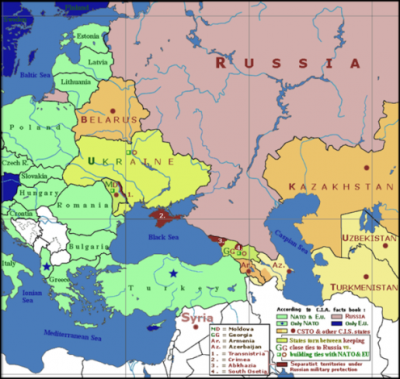CRIMEA. If Crimea returns to Russia, what might it mean for Crimean Tatars? The Crimean Peninsula has been a part of empires for over 2,700 years. National Geographic produced a series of maps showing the change of control over the Peninsula across history. It was part of the Greek Empire, the Roman Empire, the Byzantine Empire, the Mongols, and the Ottoman Empire for over 300 years (1478-1783). Catherine the Great annexed Crimea from the Ottoman Empire in 1783, part of Russian expansion and the beginning of the end for the Ottomans. From 1783 until 1991, Crimea was a part of Russia’s empire; and the population of Tatars was steadily displaced by Russians.
The Crimean Tatars are the descendants of Turkic settlers during the period of rule by the Turkish Ottoman Empire. Crimean Tatars were 12% of the Crimean population in 2001 (the most complete data available in English on the Ukraine Census website), and ethnic Russians were 58% of the total 2 million people living there. Of the total Ukrainian population, Crimean Tatars made up only 0.5% of the total population.
Since the Russian annexation of the Peninsula, history has recorded that the Crimean Tatars did not fare well under Russian administrations. In the late 18th Century, between 80,000 and 500,000 Crimean Tatars (the general consensus is between 300,000 and 500,000 people), and other minority ethnicities living in Crimea, left the Peninsula due to Russian government. They immigrated to neighbouring lands in present-day Ukraine, Bulgaria, Turkey, and further east into Asia. Brian Glyn Williams writes in The Crimean Tatars, at that time, the Russian officials felt it was expected that Crimean Tatars, as Turkic Muslims, would want to immigrate to the Ottoman Empire because of their ethnic and religious ties. However, he writes that many descendants of these immigrants believe they were subject to a form of ethnic cleansing as their land was taken by the Russians.
In addition to emigration during the 18th Century, Crimean Tatars were persecuted by Stalin. From the 1930s, Stalin ordered between 30,000 and 40,000 Crimean Tatar intellectuals deported to Siberia, and their private lands seized by the state for collectivisation. In May 1944, entire Crimean Tatar villages and suburbs (approximately 200,000 people) were rounded up by The People’s Commission of Internal Affairs (precursor to the KGB) and were deported across the steppes to Uzbekistan – far from their homeland on the Black Sea. Only well after the war, and at the wane of the Soviet Union, did Crimean Tatars return in significant numbers to their ancestral homelands, to find their population replaced by ethnic Russians.
Russian history recalls the Crimean Tatars as Nazi sympathisers when Hitler invaded the USSR, and that perception, according to Williams, continues today. The Guardian and National Geographic reported in the lead-up to the Crimean Referendum that Crimean Tatar settlers were anxious about their future in a Russian Crimean state. The Guardian reported that shops were attacked, graves defaced, and reporters for the Crimean Tatar TV station ATR were attacked on the streets. National Geographic interviewed Tatar leaders who recalled the stories of their forebears who were exiled east and called for the United Nations to intervene for their protection from pro-Russian forces. Vladimir Putin was reported to announce to the Russian Parliament that “measures should be taken to finish rehabilitation of the Tatars who returned to Crimea from internal exile”. The exact meaning of that sentiment will remain to be seen.
Crimea is going to remain a militarily contentious point for Ukraine and Russian relations, as it has for decades, because of the stationing of the Russian fleet at Sevastopol. But what will be the fate of the Crimean Tatars? We have seen throughout history that when political tensions flare, religion and ethnicity are quickly used as reasons for persecution. It would not be hard to imagine Crimean Tatars coming under greater pressure because they are an ethnic minority, historically associated as Nazi sympathisers, and because they are Muslim. One hopes that does not become the case.

